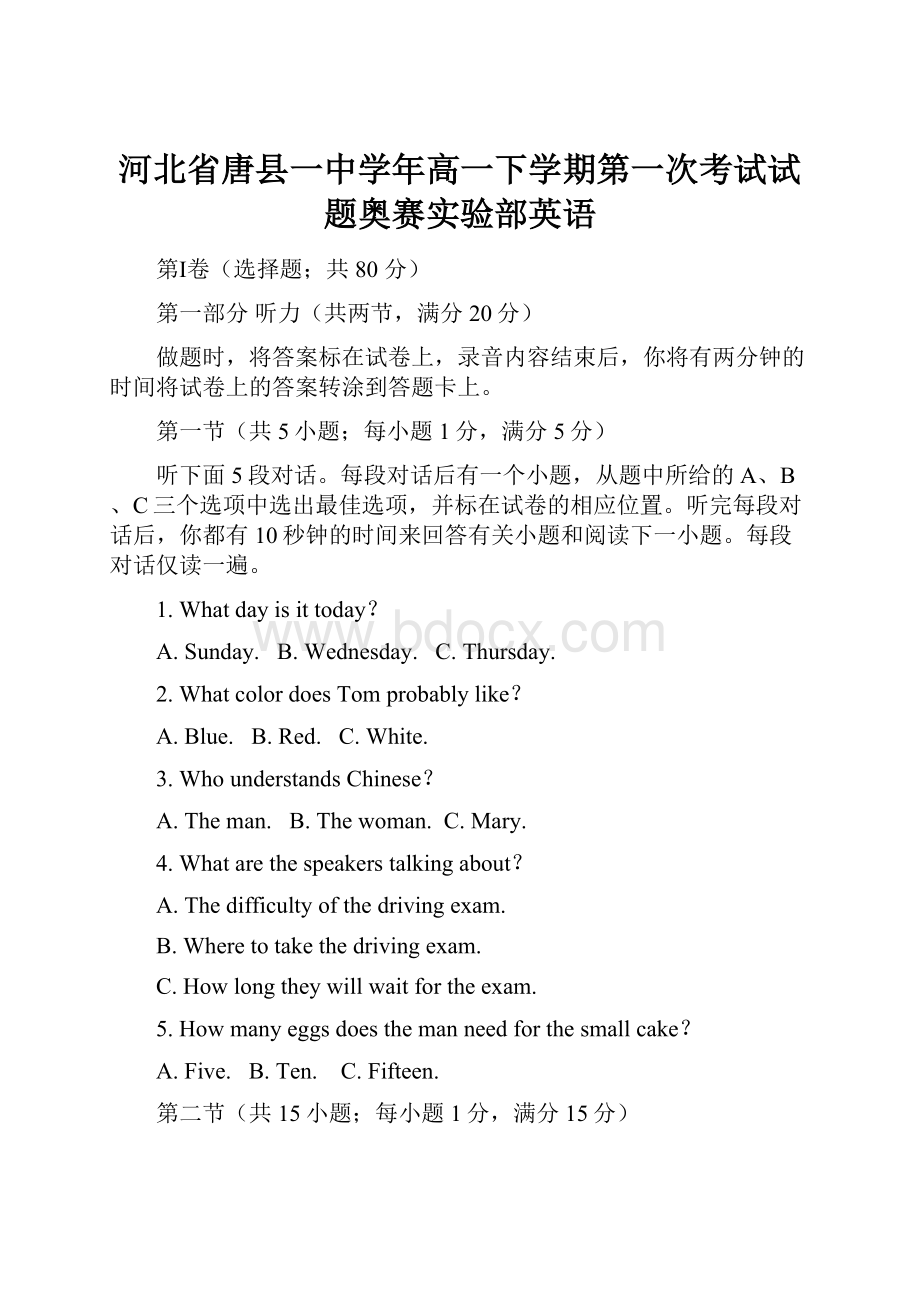河北省唐县一中学年高一下学期第一次考试试题奥赛实验部英语.docx
《河北省唐县一中学年高一下学期第一次考试试题奥赛实验部英语.docx》由会员分享,可在线阅读,更多相关《河北省唐县一中学年高一下学期第一次考试试题奥赛实验部英语.docx(18页珍藏版)》请在冰豆网上搜索。

河北省唐县一中学年高一下学期第一次考试试题奥赛实验部英语
第Ⅰ卷(选择题;共80分)
第一部分听力(共两节,满分20分)
做题时,将答案标在试卷上,录音内容结束后,你将有两分钟的时间将试卷上的答案转涂到答题卡上。
第一节(共5小题;每小题1分,满分5分)
听下面5段对话。
每段对话后有一个小题,从题中所给的A、B、C三个选项中选出最佳选项,并标在试卷的相应位置。
听完每段对话后,你都有10秒钟的时间来回答有关小题和阅读下一小题。
每段对话仅读一遍。
1.Whatdayisittoday?
A.Sunday.B.Wednesday.C.Thursday.
2.WhatcolordoesTomprobablylike?
A.Blue.B.Red.C.White.
3.WhounderstandsChinese?
A.Theman.B.Thewoman.C.Mary.
4.Whatarethespeakerstalkingabout?
A.Thedifficultyofthedrivingexam.
B.Wheretotakethedrivingexam.
C.Howlongtheywillwaitfortheexam.
5.Howmanyeggsdoesthemanneedforthesmallcake?
A.Five.B.Ten.C.Fifteen.
第二节(共15小题;每小题1分,满分15分)
听下面5段对话或独白。
每段对话或独白后有几个小题,从题中所给的ABC三个选项中选出最佳答案,并标在试卷的相应位置。
听完每段对话前,你将有时间阅读各小题,每小题5秒钟;听完后,各小题将给出5秒钟的作答时间。
每段对话或独白读两遍。
听第6段材料,回答第6、7题。
6.Whatisthemanaskingfor?
A.Ashirt.B.Askirt.C.Adryer.
7.Whatwillthemandolater?
A.Haveameeting.B.Haveajobinterview.C.Checktheroominthehotel.
听第7段材料,回答第8、9题。
8.Whereisthemangoing?
A.Miami.B.Dallas.C.Thailand.
9.Whatsuggestiondoesthewomanprovide?
A.GoingtoDallasalone.B.Cancelingtheflight.C.Packingupasmallerluggage.
听第8段材料,回答第10至12题。
10.Wherearethespeakersprobably?
A.Attheoffice.B.Attherestaurant.C.Athome.
11.Howlongwillthewomankeeponadiet?
A.1week.B.6months.C.1year.
12.Whatisthemostimportantthingforthewoman?
A.Eatingsaladonly.B.Drinkingtea.C.Eatingthingswithouttoomuchsugar.
听第9段材料,回答第13至16题。
13.Whereisthemangoing?
A.NewYork.B.London.C.Seattle.
14.Whattimeisitnow?
A.3:
35pm.B.3:
30pm.C.3:
25pm.
15.Howmuchcanacupofcoffeecostonthetrain?
A.$30.B.$20.C.$15.
16.Whydoesn’tthemantakethetrainat3:
30pm?
A.Hethinksthefoodonthetrainissoexpensive.
B.Heislateforthetrain.
C.Hedoesn’twanttogotoNewYorkfinally.
听第10段材料,回答第17至20题。
17.WhatcanbethetopicwhileeatinginAmerica?
A.Schoollife.B.Religiousbelief.C.Politicalnews.
18.WhatisimpoliteifyouvisitanAmericanfamily?
A.Bringfoodasrequired.B.Arrive3minuteslater.C.Arriveearly.
19.WhatispoliteifyouvisitanAmericanfamily?
A.Wearformalclothes.B.Keepsilentwhenyouareeating.C.Bringgiftswhenyouareinvited.
20.Whatcanprobablyhappenifyouareinvitedtoameal?
A.Informthehostessthatyouwillbelate.
B.Helpthehostessgetthemealready.
C.Takeoffyourshoes.
第二部分阅读理解(共两节,满分40分)
第一节(共15小题;每小题2分,满分30分)
阅读下列短文,从每题所给的四个选项(A、B、C和D)中,选出最佳选项,并在答题卡上将该项涂黑。
A
Proudlyreadingmywords,Iglancedaroundtheroom,onlytofindmyclassmatesbearingbigsmilesontheirfacesandtearsintheireyes.Confused,Iglancedtowardmystone-facedteacher.Havingnochoice,IslowlyraisedthereportIhadslavedover(辛苦做得),hopingtohidemyself.“Whatcouldbecausingeveryonetoactthisway?
”
Quickly,Iflashedback(回想)tothedayMissLancelotgavemethetask.Itseemedsimple:
goontheInternetandfindinformationaboutamannamedGeorgeWashington,whosenameIhadneverheardofbefore.AsIsearchedthename,itbecameevident(明显的)thatthereweretwopeoplehavingthesamenamewholookedcompletelydifferent!
Oneinventedhundredsofusesforpeanuts,whiletheotherledsomesortofarmyacrossAmerica.Istaredatthescreen,wonderingwhichonemyteachermeant.Icalledmygrandfatherforagoldenpieceofadvice:
flip(掷)acoin.Heads—thecommander,andtails(反面)—thepeanutsguy.Ah!
Tails,myreportwouldbeaboutthegreatmanwhoinventedpeanutbutter,GeorgeWashingtonCarver.
Weekslater,standingbeforemyclassmates,Iwastotallylost.Ohwell,Iloweredthepaperandsatdownatmydesk,burningtofindoutwhatIhaddonewrong.Asaclassmatebeganhisreport,itallbecameclear,“MyreportisonGeorgeWashington,themanwhostartedtheAmericanRevolution.”Thewholeworldbecamequiet!
HowcouldIknowthatshemeantthatGeorgeWashington?
Obviously,mygradewasterrible.Heartbrokenbutfearless,Idecidedtoturnthisaround.ItalkedtoMissLancelot,butsheinsisted:
Nore-dos;nonewgrade.SoIthrewmyselfheartilyintomyworkfortherestoftheschoolyear.Tenmonthslater,Ismiledwhentheheadmasterinformedmeofmychoicetoskip(跳过)thesixthgrade.Justice(公平)issweet!
21. Why was the author confused about the task?
A. He was unfamiliar with American history.
B. He followed the advice and flipped a coin.
C. He forgot his teacher’s instruction.
D. He didn’t know why the teacher gave such a task.
22. The underlined word “burning” in Para. 3 probably means _______.
A. excited B. ashamed C. ready D. eager
23. In the end, the author turned things around _______.
A. by redoing his task B. through his own efforts
C. with the help of his grandfather D. under the guidance of his headmaster
B
Howwouldyouliketolearnmorewithouthavingtostudymore?
Here’show:
1.Gettobedandgotosleep.Yourperformance,attention,andtheabilitytoconcentratearedamagedbylackofsleep.Teenagersneednineto10hoursofsleepanightforbestperformance.
2.Feedyouhead.Thebrainrunsbadlyifitdoesn’tgetenoughfuel.Thatmeansprotein(蛋白质)andcomplexcarbs(复合碳水化合物)—eggsandwheatbreadforbreakfast,say,ratherthansugarycereal(含糖的麦片粥)andorangejuice.Thebiggestmistaketeensmakeisnottohavebreakfastortogoforsugar,whichraisesbloodsugarlevels.
3.Bodyexerciseisbrainexercise.Bodyexercisereallyimprovesbrainperformance,perhapsbecauseitincreasesbloodflow,orperhapsbecauseitreducesstressandanxiety.Twentyminutesofactivityadaythatraisesyourheartratewilldogreatgood.
4.Learnnowwhatyouwanttorememberfortherestofyourlife.Teenagebrainsaremuchbetteratrememberingthingsthanthebrainsofyoungchildrenoradults.Scientistsaren’tsurewhy.Whateverthereason,theteenageyearsarethetimetolearnnewlanguagesandmasterotherlifelongskills.
5.Learnthepowerofrisk-taking.Adultsarealwaysworriedaboutthedownsideofteenagerisk-taking,andit’struethatteenagersaremorelikelythanadultstogetthemselvesintroublebydrinkinganddriving.Butthefactthatthepartsofthebrainthatdrivepeopletotrynew,risky,andexcitingthingsappeartobemoredevelopedinteenagerscanbeahugeadvantage.Pickcertainchallengers—difficultsports,ahardjob.Masteringaperformanceart,travelingoverseas–andtheteenagebrainisabletodealwiththem.Theyhavethispowerthey’regiventogooutanddoitwithoutfear.
6.Learnwhatyoulove.Becauseemotional(情感的)systemsdevelopfastinteenagerbrains,teenagerslearnthingsthey’reinterestedinquicklyandwell.Theirbrainsgivethemtoolslikeattentionontheproject.
24.Accordingtothepassage,teenagersshouldhave__________forbreakfast.
A.sugarandbreadB.sugarandorangejuice
C.wheatbreadandeggsD.wheatbreadandorangejuice
25.BodyexerciseplaysapartinallthefollowingEXCEPT_________________.
A.reducingbloodpressureB.raisingheartrate
C.makingpeoplelessanxiousD.reducingstress
26.Theunderlinedword“downside”inthepassageprobablymeans_________.
A.excitementB.powerC.benefitD.disadvantage
27.Itcanbelearnedfromthepassagethat________________.
A.teenagersneedlesssleepthanadults
B.teenagersshouldbeforbiddentodrive
C.scientistsknowwhyteenagershaveagoodmemory
D.teenagerslearnquicklywhentheyarefondofsomething
C
YoumaythinkthatEnglishdictionarieshavebeenusedformany,manycenturies.ThespellingofEnglishhasalwaysbeenaproblembutitwasmoreofaprobleminthedaysbeforeadictionary.Thenpeoplecouldspellwordsindifferentwayswhichyoumightfindinteresting.ButitmadereadingEnglishmuchmoredifficult.Sodictionarieswereinventedtoencourageeverybodytospellthesame.Infact,anEnglishdictionarylikethekindyouusetodaywasn’tmadeuntilthetimeofthelateQingDynasty.Threemendidmostoftheimportantearlyworkondictionaries:
SamuelJohnson,NoahWebster,andJamesMurray.Thesemenspentnearlyalloftheirlivestryingtocollectwordsfortheirdictionaries.Forthem,itwasn’tonlyajob;itwasawonderfuljourneyofdiscovery.ThelargestdictionaryintheworldistheOxfordEnglishDictionary,orOEDforshort.TheideaforthisdictionarycamefromanimportantmeetinginBritainin1857.Twenty-twoyearslater,OxfordUniversityaskedJamesMurraytobetheeditorofitsnewdictionary.
Murrayhadneverbeentocollege.Attheageoffourteen,helefthisvillageschoolinScotlandandtaughthimselfwhileworkinginabank.Laterhebecameagreatteacher.AfterOxfordgavehimthejob,Murrayhadaplacebuiltinthegardenbehindhishousetodohiswork.Partofitwasonemetreunderground.Inwinteritfeltlikeabarn,hehadtowearaheavycoatandputhisfeetinaboxtokeepwarm.Everymorning,Murraygotoutofbedatfiveo’clockandworkedseveralhoursbeforebreakfast.Oftenhewouldworkbycandlelightintotheevening.Murrayhopedtofinishthenewdictionaryintenyears.Butafterfiveyears,hewasstilladdingwordsfortheletterA!
ThenotherswenttoworkwithMurray,includinghistwodaughters.Heworkedonthedictionaryuntilhewasveryold.Forty-fouryearslater,in1928,othereditorsfinishedit.Itincludedmorethan15,000wordsintwelvebooks.AndyouthoughtyourEnglishdictionarywasbig!
28.WhichofthefollowingisTRUEaccordingtothereading?
A.Peopledidn’tknowhowtospellwordsinthedaysbeforeadictionary.
B.SamuelJohnson,NoahWebster,andJamesMurrayd